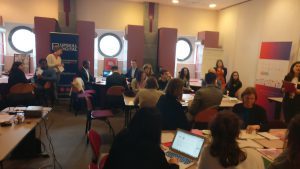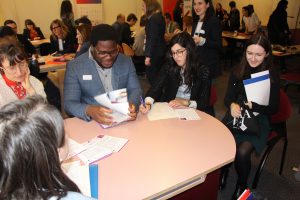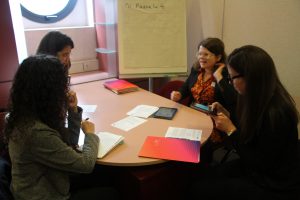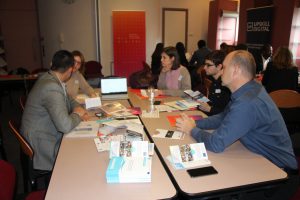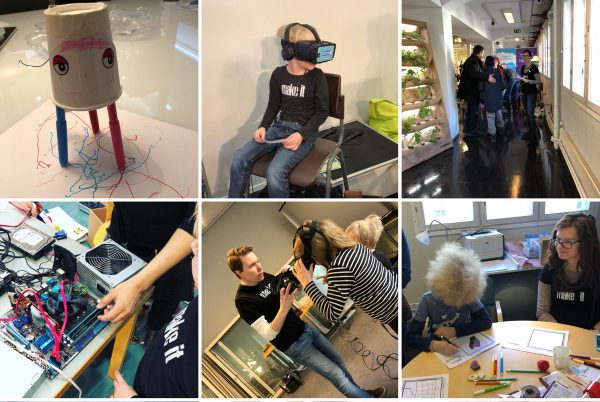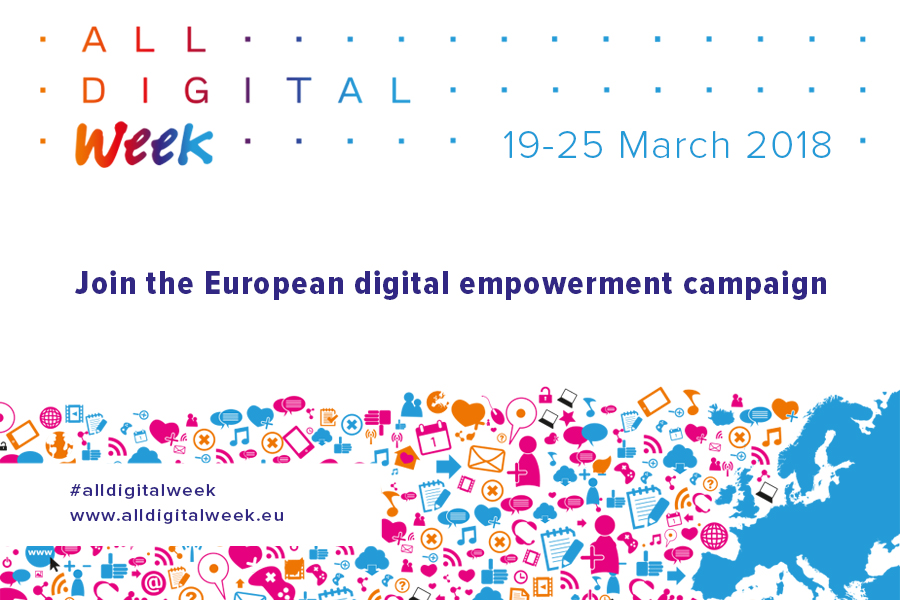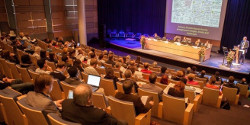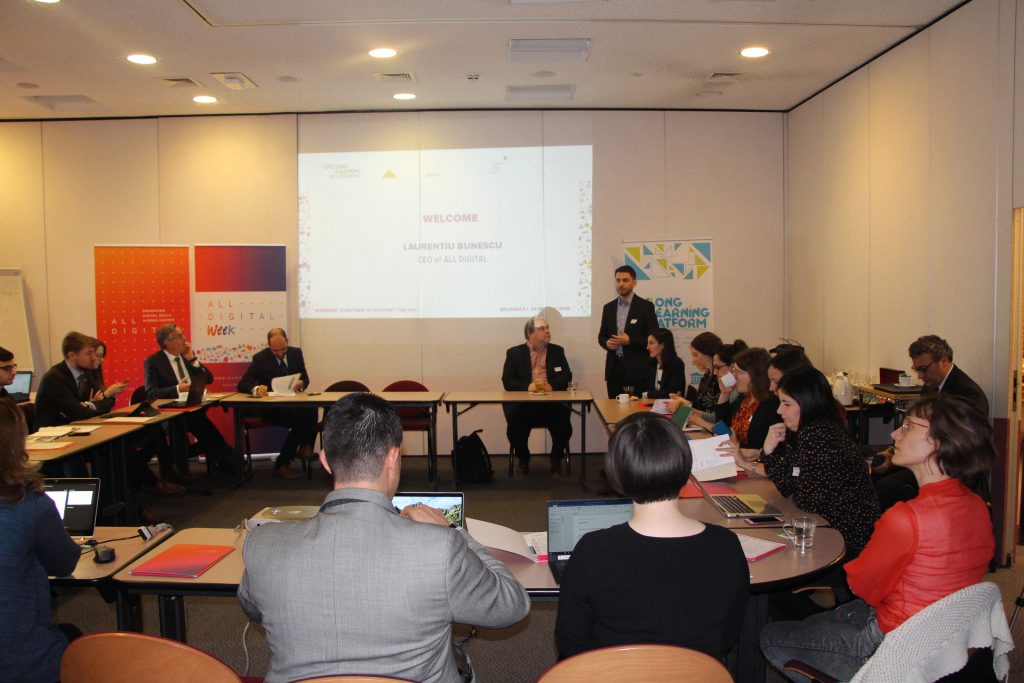
28 Mar Working together to better support the 43%
28 Mar, 2019
…of Europeans lacking digital skills
On 26 March, ALL DIGITAL and the Lifelong Learning Platform gathered European stakeholders to tackle the burning issue of digital skills and media literacy. 43% of European citizens lack digital skills to be able to fully participate in and benefit from the digital society. How do we work together to support them? What are the best approaches to raise awareness of the importance of digital skills and how to ensure relevant impact. These were the key question that representatives of EU institutions, civil society organisations, education institutions and practitioners came together to discuss at The 43 event as part of the ALL DIGITAL Week.
Laurentiu Bunescu, CEO of ALL DIGITAL, introduced the topic in the context of ALL DIGITAL Week and EU Media Literacy Week and the two host organisations. Watch the video
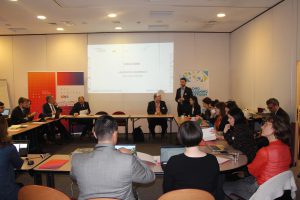 The speakers and panelists were:
The speakers and panelists were:
- Rodrigo Ballester, Member of the Cabinet of Commissioner Tibor Navracsics
- Lara Orlandi, Policy Officer, DG CONNECT, Audiovisual & Media Services Policy Unit
- Andras Szucs, Secretary General, EDEN
- Fiona Fanning, Director of European Affairs, Certiport
- Ilona Kish, Director, Public Libraries 2030
- Yves Punie, Deputy Head of Unit and Senior Researcher, JRC – European Commission
The discussion was moderated by Andrea Parola, European E-Skills Association
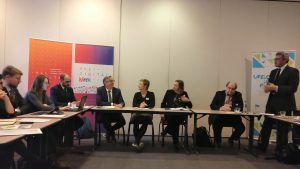
Looking at the complex picture behind the figure of 43% as an EU average was a recurring theme of the day. Big differences are evident between countries (especially on the North-South and West-East divides) as well as within countries between rural and urban areas. Adapting efforts to address this diversity was a message shared by several speakers.
 Considering digital skills within the broader view of social inclusion was also a pivotal point of the debate. Rodrigo Ballester, from the Cabinet of Commissioner Navracsics, stressed that beyond skills mismatches we need to think about inclusion and “digital citizenship”. This includes the promotion of critical thinking and media literacy skills in all sectors of education. He underlined that in many cases young people may perceive themselves as digitally “confident” but are not digitally “competent”, and this strikes an important difference. Watch the video
Considering digital skills within the broader view of social inclusion was also a pivotal point of the debate. Rodrigo Ballester, from the Cabinet of Commissioner Navracsics, stressed that beyond skills mismatches we need to think about inclusion and “digital citizenship”. This includes the promotion of critical thinking and media literacy skills in all sectors of education. He underlined that in many cases young people may perceive themselves as digitally “confident” but are not digitally “competent”, and this strikes an important difference. Watch the video
The Digital Competence Framework (DigComp) can indeed be a starting point in identifying the skills gap, as Yves Punie, from the Joint Research Centre of the European Commission, pointed out. DigComp identifies the main components of digital competencies and breaks them down to deliver the framework of what is needed in European societies. Ilona Kish from Public Libraries 2030 recalled that it is not just a question of digital skills themselves but about “how we live and work together in the digital shift”.
Other panellists like Andras Szucs, from the European Distance and E-learning Network, and Fiona Fanning, Certiport, stressed the need to improve our system of digital learning by starting to promote policy and practice across the whole of Europe and beyond.
 Lara Orlandi, from DG CONNECT, explained that the concept of media literacy has now entered the common discourse in Europe and is indeed at the centre of institutional concerns. Lara talked about the EU Media Literacy Week organised by DG CONNECT on 18-23 May to draw the public attention to the issue of disinformation, importance of professional quality journalism and media literacy skills and education. This goes hand-in-hand – we need to find a sustainable model for quality journalism and provide consumers/readers with the right skills to decode the messages and be more media literate. Some of the takeaways from the conference are:
Lara Orlandi, from DG CONNECT, explained that the concept of media literacy has now entered the common discourse in Europe and is indeed at the centre of institutional concerns. Lara talked about the EU Media Literacy Week organised by DG CONNECT on 18-23 May to draw the public attention to the issue of disinformation, importance of professional quality journalism and media literacy skills and education. This goes hand-in-hand – we need to find a sustainable model for quality journalism and provide consumers/readers with the right skills to decode the messages and be more media literate. Some of the takeaways from the conference are:
- Media, public authorities and regulators should work together to promote media literacy
- Media literacy should be part of school curricula
- Reaching out to older users is an increasingly recognised challenge
- Self-regulation and trusted media labels would contribute to a trusted and diverse media environment.
See the presentation and watch the video
ALL DIGITAL Week was presented as an example of a large-scale European digital empowerment campaign run at three levels – European – national – local and involving each year about 30 country partners and over a thousand local organisations to promote the campaign and run training activities on a wide spectrum of Digital Skills. Ekaterina Clifford, campaign manager, stressed the crucial role of multi-sectoral partnerships on all levels for the success of the campaign, involvement of country partners in its design, and explained the evolution of the approaches over the years. See the ALL DIGITAL Week presentation and watch the video in which partners explain why they are part of the campaign.

With so many campaigns, how is it possible to make yours efficient?
All the panellists agreed that methods and approaches depend on the purpose, scale, and target groups.
- Multi-stakeholder multi-sectoral partnerships are relevant for the success. It is crucial to design it in collaboration with different stakeholders working on all the levels. You need to engage widely with national and European stakeholders, bringing the national politicians and important respected personalities. E.g., for a Europe-wide campaign, we need to involve national partners and local grassroots organisations to ensure the relevance and credibility.
- Avoid duplications so that we align and join forces together – thus we can reach much wider audiences.
- Decide beforehand what the campaign is trying to achieve in the short, medium and long term, and consider carefully the expected impact – reach 100 000 people or really change the lives of 100 in a meaningful way? Sometimes you would need to educate funders of the campaign to adopt meaningful measures
Fiona Fanning mentioned the EAST methodology the Certiport and their partners are using while designing the campaigns, which in short means:
- E – make it easy and effortless. Make it easy for people to get the skills they need
- A – attractive – make it enjoyable, personalised, speak to their motivation, try to provide incentives
- S – social – people like social interaction as part of their learning experience,
- T – timely – targeted to when the people are most receptive and most feeling the need.
Which tools to use – leaflets, ads, banners, or maybe pigeons ? – depends on the target audience. For people who are not digitally literate, you cannot put ads online, you should go to social organisations and libraries and have some leaflets printed; for young people – schools and social media. Andras provocatively commented that at large we are working with consumers who are looking for the interest. There are many tools that are still relevant, appropriate to use, not too expensive, and social media is among those. And in that respect, ‘consumers’ personal interests include being active on social media to share information, and this is what sustains the information sharing.
Yves Punie suggested that another instrument for campaigns could be self-assessment tools and gave an example of SELFIE raising a number of digital competences issues on a school level for students and teachers. It is a self-reflection exercise, but also an important instrument of awareness raising.
Ilona Kish emphasized that with all the approaches we need to remember that the focal point of any campaign should be the impact. Why does it matter? Why is this important for a particular person? And this is where storytelling comes in place and can be an extremely efficient tool.
Ilona also emphasized the importance of exchange across countries and projects. Currently, on the one hand, there are many effective initiatives on national level, which are not reproducible across different countries, and on the other – there is a huge amount of replication, dozens of equally good initiatives. So we should look at better sharing the knowledge and resource.
VIDEO Panel Discussion Part 1
VIDEO Panel Discussion Part 2
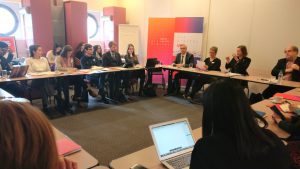
And with that in mind, the second part of the meeting was devoted to sharing the experiences and projects – participants also had the chance to learn about a diverse collection of inspiring practices in supporting citizens to acquire digital skills and media literacy, including:
- LLLP’s project DIGIT on digital footprint for adults;
- UpSkill Digital UK, a service of digital trainers (see the presentation UpSkill Digital);
- the ALL DIGITAL project Smart Women on training women in entrepreneurship to bring their own businesses online;
- the Erasmus+ Virtual Exchange, a project that facilitates intercultural learning through online exchanges;
- and the DLEARN project Elithe on innovative methodologies for STEM teachers.


